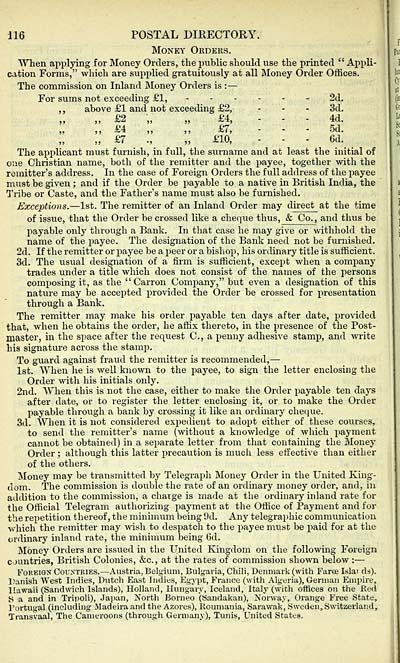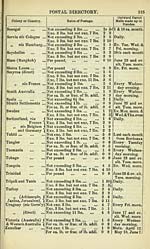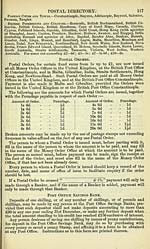Towns > Dundee > 1809-1912 - Dundee directory > 1891-1892
(134)
Download files
Complete book:
Individual page:
Thumbnail gallery: Grid view | List view

116 POSTAL DIRECTORY.
Money Orders.
"When applying for Money Orders, the public should use the printed " Appli-
cation Forms," which are supplied gratuitously at all Money Order Offices.
The commission on Inland Money Orders is : —
For sums not exceeding £1, 2d.
, , above £1 and not exceeding £2, ... 3(J,
,, ,, £2 ,, ,, £4, - - . 4(1.
,, ,, s/4 ,, ,, X//, - . - ^(X^
„ £7 ., „ £10, . - - 6d.
The applicant must furnish, in fvill, the surname and at least the initial of
one Christian name, both of the remitter and the payee, together with the
remitter's address. In the case of Foreign Orders the full address of the j)ayee
must be given ; and if the Order be payable to a native in British India, the
Tribe or Caste, and the Father's name must also be furnished.
Exceptions. — 1st. The remitter of an Inland Order may direct at the time
of issue, that the Order be crossed like a cheque thus, & Co., and thus be
payable only through a Bank. In that case he may give or withhold the
name of the payee. The designation of the Bank need not be furnished,
2d. If the remitter or i^ayee be a j)eer or a bishop, his ordinary title is sufficient.
3d. The usual designation of a firm is sufficient, except when a company
trades under a title which does not consist of the names of the persons
composing it, as the "Carron Company," but even a designation of this
nature may be accepted provided the Order be crossed for j)resentation
through a Bank.
The remitter may make his order payable ten days after date, provided
that, when he obtains the order, he affix thereto, in the presence of the Post-
master, in the space after the request C, a penny adhesive stamp, and write
his signature across the stamp.
To guard against fraud the remitter is recommended, —
1st. When lie is well known to the payee, to sign the letter enclosing the
Order with his initials only.
2nd. When this is not the case, either to make the Order payable ten days
after date, or to register the letter enclosing it, or to make the Order
payable through a bank by crossing it like an ordinary cheque.
3d. When it is not considered expedient to adopt either of these courses,
to send the remitter's name (without a knowledge of which jjayment
cannot be obtained) in a separate letter from that containing the Money
Order ; although this latter precaution is much less effective than either
of the others.
jNIoney may be transmitted by Telegraph Money Order in the United King-
dom. The commission is double the rate of an ordinary money order, and, in
addition to the commission, a charge is made at the ordinary inland rate for
the Official Telegram authorizing j^ayment at the Office of Payment and for
the repetition thereof, the minimum being 9d. Any telegraphic communication
which the remitter may wisli to despatch to the payee must be -pikid for at the
ordinary inland rate, the minimum being 6d.
Money Orders are issued in the United Kingdom on the following Foreign
countries, British Colonies, &c., at the rates of commission shown below : —
Foreign Couxtries. — Austria, Belgium, Bulgaria, Chili, Denmark (with Farce Islai ds).
Danish West Indies, Dutch East Indies, Egj^pt, France (with Algeria), German Empire,
Hawaii (Sandwich Islands), Holland, Hungary, Iceland, Italy (with offices on the Red
S a and in Tripoli), Japan, North Borneo (Sandakan), Norway, Orange Free State,
I'ortugal (including Madeira and the Azores), Roumania, Sarawak, Sweden, Switzerland,
Transvaal, The Cameroons (through Germany), Tunis, United States,
Money Orders.
"When applying for Money Orders, the public should use the printed " Appli-
cation Forms," which are supplied gratuitously at all Money Order Offices.
The commission on Inland Money Orders is : —
For sums not exceeding £1, 2d.
, , above £1 and not exceeding £2, ... 3(J,
,, ,, £2 ,, ,, £4, - - . 4(1.
,, ,, s/4 ,, ,, X//, - . - ^(X^
„ £7 ., „ £10, . - - 6d.
The applicant must furnish, in fvill, the surname and at least the initial of
one Christian name, both of the remitter and the payee, together with the
remitter's address. In the case of Foreign Orders the full address of the j)ayee
must be given ; and if the Order be payable to a native in British India, the
Tribe or Caste, and the Father's name must also be furnished.
Exceptions. — 1st. The remitter of an Inland Order may direct at the time
of issue, that the Order be crossed like a cheque thus, & Co., and thus be
payable only through a Bank. In that case he may give or withhold the
name of the payee. The designation of the Bank need not be furnished,
2d. If the remitter or i^ayee be a j)eer or a bishop, his ordinary title is sufficient.
3d. The usual designation of a firm is sufficient, except when a company
trades under a title which does not consist of the names of the persons
composing it, as the "Carron Company," but even a designation of this
nature may be accepted provided the Order be crossed for j)resentation
through a Bank.
The remitter may make his order payable ten days after date, provided
that, when he obtains the order, he affix thereto, in the presence of the Post-
master, in the space after the request C, a penny adhesive stamp, and write
his signature across the stamp.
To guard against fraud the remitter is recommended, —
1st. When lie is well known to the payee, to sign the letter enclosing the
Order with his initials only.
2nd. When this is not the case, either to make the Order payable ten days
after date, or to register the letter enclosing it, or to make the Order
payable through a bank by crossing it like an ordinary cheque.
3d. When it is not considered expedient to adopt either of these courses,
to send the remitter's name (without a knowledge of which jjayment
cannot be obtained) in a separate letter from that containing the Money
Order ; although this latter precaution is much less effective than either
of the others.
jNIoney may be transmitted by Telegraph Money Order in the United King-
dom. The commission is double the rate of an ordinary money order, and, in
addition to the commission, a charge is made at the ordinary inland rate for
the Official Telegram authorizing j^ayment at the Office of Payment and for
the repetition thereof, the minimum being 9d. Any telegraphic communication
which the remitter may wisli to despatch to the payee must be -pikid for at the
ordinary inland rate, the minimum being 6d.
Money Orders are issued in the United Kingdom on the following Foreign
countries, British Colonies, &c., at the rates of commission shown below : —
Foreign Couxtries. — Austria, Belgium, Bulgaria, Chili, Denmark (with Farce Islai ds).
Danish West Indies, Dutch East Indies, Egj^pt, France (with Algeria), German Empire,
Hawaii (Sandwich Islands), Holland, Hungary, Iceland, Italy (with offices on the Red
S a and in Tripoli), Japan, North Borneo (Sandakan), Norway, Orange Free State,
I'ortugal (including Madeira and the Azores), Roumania, Sarawak, Sweden, Switzerland,
Transvaal, The Cameroons (through Germany), Tunis, United States,
Set display mode to: Large image | Transcription
Images and transcriptions on this page, including medium image downloads, may be used under the Creative Commons Attribution 4.0 International Licence unless otherwise stated. ![]()
| Scottish Post Office Directories > Towns > Dundee > Dundee directory > 1891-1892 > (134) |
|---|
| Permanent URL | https://digital.nls.uk/84229048 |
|---|
| Description | Imprint varies. |
|---|---|
| Shelfmark | Various |
| Description | Directories of individual Scottish towns and their suburbs. |
|---|
| Description | Around 700 Scottish directories published annually by the Post Office or private publishers between 1773 and 1911. Most of Scotland covered, with a focus on Edinburgh, Glasgow, Dundee and Aberdeen. Most volumes include a general directory (A-Z by surname), street directory (A-Z by street) and trade directory (A-Z by trade). |
|---|


